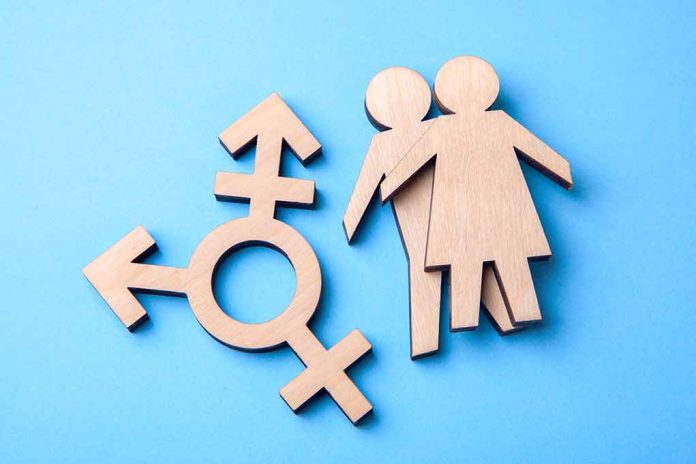
The Trump administration’s bombshell HHS report reveals that “gender-affirming” treatments for minors pose irreversible harms while showing little evidence of actual benefits.
Key Takeaways
- The HHS report concludes that medical interventions for gender dysphoria in minors carry significant risks with weak evidence of benefits
- Trump’s administration advocates for behavioral therapy over puberty blockers, cross-sex hormones, and surgeries for transgender youth
- The report identifies irreversible harms, including infertility, sexual dysfunction, impaired bone density, and surgical complications
- This position aligns with several countries, like the UK, that have begun restricting these interventions
- An executive order from President Trump prohibits federal support for gender transitions for those under 19
HHS Warns Against Unproven Medical Interventions for Minors in 2025
The U.S. Department of Health and Human Services has released a comprehensive report that critically examines so-called “gender-affirming care” for children experiencing gender dysphoria. The review represents a significant shift in federal policy, highlighting substantial risks of medical interventions while questioning their purported benefits. After analyzing 17 systematic reviews, the report found uncertain evidence for benefits and more certain evidence for harm, challenging the narrative that these treatments are necessary or “life-saving” for youth struggling with gender identity issues.
NIH Director Dr. Jay Bhattacharya emphasized the administration’s commitment to protecting children from experimental procedures, stating, “Our duty is to protect our nation’s children, not expose them to unproven and irreversible medical interventions. We must follow the gold standard of science, not activist agendas,” said Dr. Jay Bhattacharya, National Institutes of Health Director
The comprehensive review directly contradicts guidelines from organizations like the World Professional Association for Transgender Health and the American Medical Association, which have supported medical interventions for minors. Instead, the Trump administration’s report advocates for behavioral therapy approaches that address underlying psychological factors without resorting to irreversible medical treatments. This position represents a rejection of the Obama-era policies that promoted more aggressive gender transition treatments.
Gender transition care for transgender children and teens lacks evidence of benefits and poses risks, according to a new report by the Trump administration that medical experts described as poor quality research that threatens access to care. https://t.co/MAEGbWP6i2
— The Washington Post (@washingtonpost) May 2, 2025
Significant Health Risks Identified in Gender Transition Treatments
The HHS report outlines alarming risks associated with medical interventions for gender dysphoria, especially for minors. These include permanent infertility, sexual dysfunction, impaired bone density, negative cognitive impacts, increased risk of cardiovascular disease, psychiatric disorders, and surgical complications. The review focuses particular concern on puberty blockers and cross-sex hormones, which are frequently presented as safe, reversible options despite lacking FDA approval for treating gender dysphoria.
Most concerning is the review’s finding that existing studies supporting medical interventions suffer from serious methodological flaws, including selection bias, high dropout rates, and inadequate follow-up periods. This raises significant questions about the scientific foundation for treatments that have life-altering consequences for children and adolescents. The report specifically challenges the claim that these interventions reduce suicidal ideation, noting that evidence for this assertion has “very low certainty.”
“It’s very chilling to see the federal government injecting politics and ideology into medical science,” said Shannon Minter, the legal director at the National Center for Lesbian Rights. Minter said the report could create fear for families seeking care and for medical providers,” said Shannon Minter, National Center for Lesbian Rights Legal Director
President Trump has already taken action on this issue, signing an executive order that prohibits federal support for gender transitions for individuals under 19 years old. The order faced legal challenges, with a judge blocking certain provisions related to research and educational grants. However, the administration remains committed to protecting minors from treatments that lack solid scientific backing.
Global Trend Toward Caution in Pediatric Gender Medicine
The Trump administration’s position aligns with an emerging international consensus. Health authorities in several countries, including the United Kingdom, Sweden, Finland, and Norway, have imposed significant restrictions on gender transition interventions for minors in recent years. These nations have conducted their systematic reviews and arrived at similar conclusions about the uncertain benefits and considerable risks of these treatments, particularly for young people whose identities are still developing.
The report also challenges the assertion that denying these interventions leads to increased suicide risk among transgender youth, noting the lack of high-quality evidence for this claim. Instead, it emphasizes that healthcare providers have an ethical obligation to refuse interventions with disproportionate risks, even when requested by patients or their families. This position restores the traditional medical ethics principle of “first, no harm” to a field that has become increasingly politicized.
Most Republican-controlled states have already enacted bans or restrictions on gender-affirming care, reflecting widespread concerns about these procedures. The federal report now provides substantial scientific backing for these policy decisions, emphasizing the need for careful, evidence-based approaches to helping children with gender dysphoria rather than rushing into irreversible medical interventions. This represents a significant victory for those advocating for more cautious approaches to treating gender dysphoria in minors.













